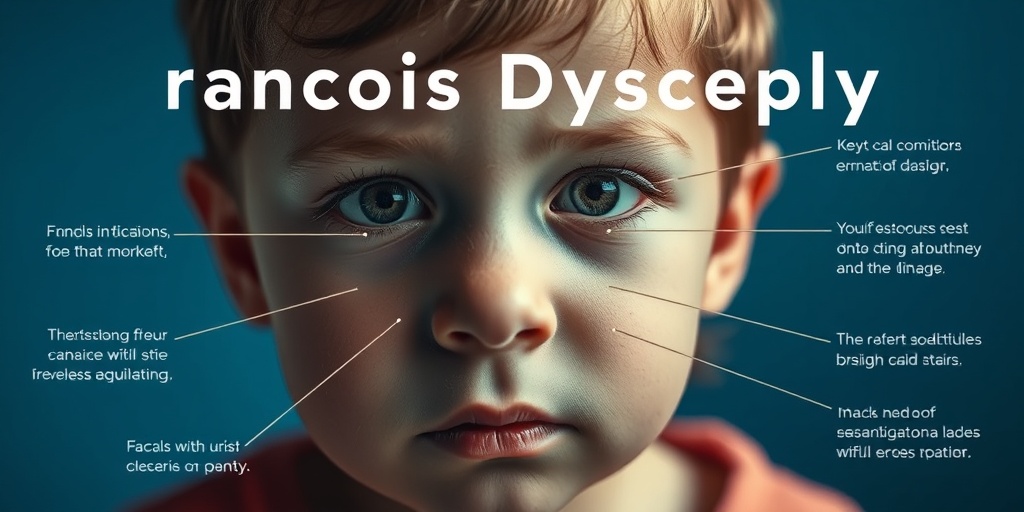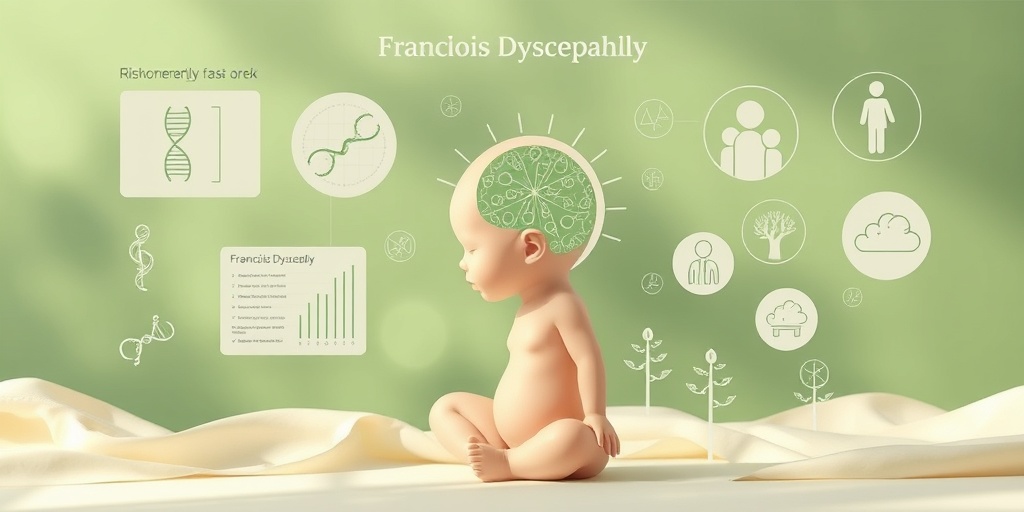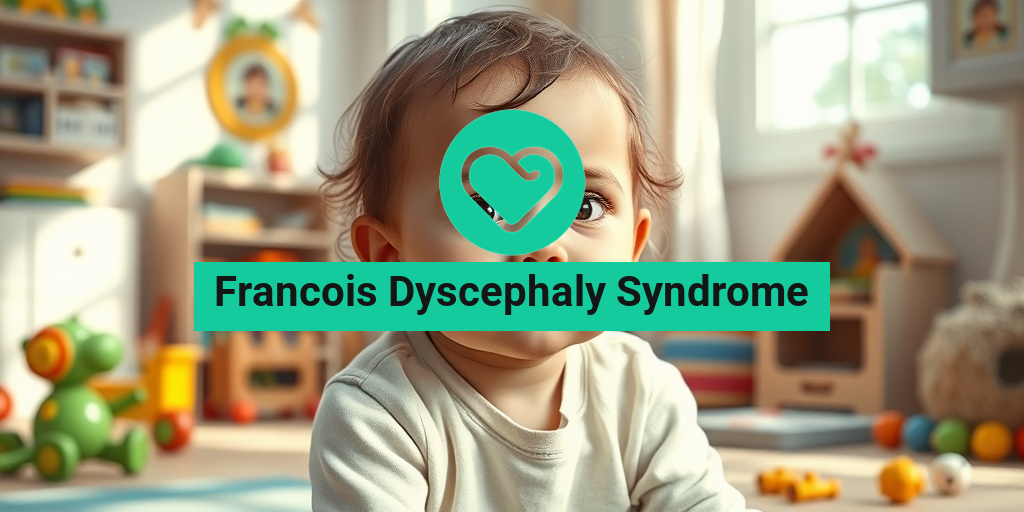What Is Francois Dyscephaly Syndrome?
Francois Dyscephaly Syndrome is a rare genetic disorder characterized by a range of developmental and physical abnormalities. This condition primarily affects the structure of the head and face, leading to distinctive features that can be identified at birth or shortly thereafter. The syndrome is named after the French physician who first described it, and it is essential for healthcare professionals and families to understand its implications.
The underlying cause of Francois Dyscephaly Syndrome is often linked to genetic mutations that affect the normal development of the brain and skull. These mutations can occur spontaneously or be inherited from parents. While the exact prevalence of this syndrome is not well-documented, it is considered extremely rare, making awareness and understanding crucial for early diagnosis and intervention.
Genetic Factors
Research indicates that Francois Dyscephaly Syndrome may be associated with specific genetic markers. Genetic testing can help identify these markers, providing valuable information for families regarding the likelihood of recurrence in future pregnancies. Understanding the genetic basis of the syndrome can also aid in developing targeted therapies and interventions.
Importance of Early Diagnosis
Early diagnosis of Francois Dyscephaly Syndrome is vital for managing the condition effectively. Healthcare providers often rely on a combination of physical examinations, imaging studies, and genetic testing to confirm the diagnosis. Early intervention can significantly improve the quality of life for affected individuals, allowing for tailored therapies that address specific symptoms and challenges.
Francois Dyscephaly Symptoms
The symptoms of Francois Dyscephaly Syndrome can vary widely among individuals, but several common features are often observed. Understanding these symptoms can help parents and caregivers recognize the condition early and seek appropriate medical advice.
Physical Characteristics
- Facial Dysmorphism: Individuals with Francois Dyscephaly Syndrome may exhibit distinct facial features, including a flat nasal bridge, wide-set eyes, and a small jaw.
- Head Shape Abnormalities: The shape of the head may be irregular, often described as having a prominent forehead or an elongated skull.
- Growth Delays: Many children with this syndrome experience delays in growth and development, which can affect their overall health and well-being.
Neurological Symptoms
In addition to physical characteristics, Francois Dyscephaly Syndrome can also lead to neurological symptoms. These may include:
- Developmental Delays: Children may experience delays in reaching developmental milestones, such as walking or speaking.
- Intellectual Disabilities: Some individuals may have varying degrees of intellectual disability, impacting their learning and cognitive abilities.
- Seizures: In some cases, seizures may occur, requiring careful management and monitoring by healthcare professionals.
Other Associated Symptoms
Aside from the primary symptoms, individuals with Francois Dyscephaly Syndrome may also face other challenges, including:
- Hearing Impairments: Some children may have hearing loss, which can affect their communication skills.
- Vision Problems: Vision issues, such as strabismus (crossed eyes), may also be present.
- Behavioral Challenges: Behavioral issues, including anxiety and social difficulties, can arise as children grow older.
Recognizing the symptoms of Francois Dyscephaly Syndrome is crucial for timely intervention and support. If you suspect that your child may be exhibiting signs of this syndrome, it is essential to consult with a healthcare professional for a comprehensive evaluation.
For more information and resources on Francois Dyscephaly Syndrome and other health-related topics, consider visiting Yesil Health AI, where you can find evidence-based answers to your health questions.
Understanding Francois Dyscephaly Syndrome can empower families and caregivers to seek the necessary support and interventions, ultimately improving the quality of life for those affected. 🌟

Causes of Francois Dyscephaly
Francois Dyscephaly Syndrome is a rare congenital condition characterized by distinct craniofacial abnormalities and neurological issues. Understanding the causes of this syndrome is crucial for early diagnosis and intervention. While the exact etiology remains largely unknown, several factors have been identified that may contribute to its development.
Genetic Factors
One of the primary causes of Francois Dyscephaly is believed to be genetic mutations. These mutations can occur spontaneously or be inherited from parents. Research suggests that specific genes associated with craniofacial development may play a significant role in the manifestation of this syndrome. Genetic testing can help identify these mutations, providing valuable information for affected families.
Environmental Influences
In addition to genetic factors, environmental influences during pregnancy may also contribute to the development of Francois Dyscephaly. Some studies indicate that exposure to certain teratogens—substances that can cause malformations—during critical periods of fetal development may increase the risk of congenital conditions. These teratogens can include:
- Alcohol
- Tobacco
- Certain medications
- Infections (e.g., rubella, cytomegalovirus)
Pregnant individuals should be aware of these risks and consult healthcare providers to minimize exposure to harmful substances.
Maternal Health Conditions
The health of the mother during pregnancy can significantly impact fetal development. Conditions such as diabetes, obesity, and autoimmune disorders have been linked to an increased risk of congenital anomalies, including Francois Dyscephaly. Proper prenatal care and management of existing health conditions are essential for reducing these risks.
Risk Factors for Francois Dyscephaly
Identifying the risk factors associated with Francois Dyscephaly can help in understanding who may be more susceptible to this condition. While anyone can be affected, certain factors may increase the likelihood of occurrence.
Family History
A family history of congenital disorders can be a significant risk factor for Francois Dyscephaly. If there are known cases of similar syndromes or genetic conditions in the family, the risk of having a child with Francois Dyscephaly may be higher. Genetic counseling can provide insights and guidance for families with a history of congenital anomalies.
Advanced Maternal Age
Women who are of advanced maternal age (typically defined as 35 years or older) may face a higher risk of having a child with congenital conditions, including Francois Dyscephaly. This increased risk is thought to be related to the quality of eggs and the likelihood of chromosomal abnormalities. Prenatal screening and testing can help assess risks for older mothers.
Previous Births with Congenital Anomalies
Having a previous child with a congenital anomaly can also elevate the risk for subsequent pregnancies. This history may indicate an underlying genetic predisposition or environmental factors that could affect future pregnancies. Parents in this situation should discuss their concerns with healthcare providers to explore potential preventive measures.
Socioeconomic Factors
Socioeconomic status can influence access to healthcare, nutrition, and prenatal care, all of which are vital for a healthy pregnancy. Individuals from lower socioeconomic backgrounds may face barriers that increase the risk of complications during pregnancy, potentially leading to conditions like Francois Dyscephaly. Ensuring access to comprehensive prenatal care is essential for all expectant parents.
In summary, while the exact causes of Francois Dyscephaly remain unclear, a combination of genetic, environmental, and maternal health factors contribute to its development. Understanding these causes and risk factors is crucial for early detection and intervention, ultimately improving outcomes for affected individuals. 🌟

Diagnosis of Francois Dyscephaly
Francois Dyscephaly Syndrome is a rare congenital disorder characterized by distinct craniofacial abnormalities and neurological issues. Diagnosing this syndrome can be challenging due to its rarity and the variability of symptoms among affected individuals. Early diagnosis is crucial for effective management and intervention.
Clinical Evaluation
The diagnosis of Francois Dyscephaly typically begins with a comprehensive clinical evaluation. Healthcare professionals will assess the patient’s medical history and conduct a thorough physical examination. Key features to look for include:
- Craniofacial Abnormalities: These may include a prominent forehead, wide-set eyes, and a flat nasal bridge.
- Neurological Symptoms: Patients may exhibit developmental delays, seizures, or other neurological impairments.
- Growth Patterns: Monitoring growth and development is essential, as individuals with this syndrome may experience growth retardation.
Genetic Testing
Genetic testing plays a pivotal role in confirming the diagnosis of Francois Dyscephaly. A geneticist may recommend tests such as:
- Chromosomal Analysis: This test can identify chromosomal abnormalities that may be associated with the syndrome.
- Targeted Gene Testing: Specific genes known to be linked to craniofacial syndromes can be analyzed.
These tests help to rule out other conditions and provide a clearer picture of the genetic factors involved in Francois Dyscephaly.
Imaging Studies
Imaging studies, such as MRI or CT scans, may be utilized to assess brain structure and identify any associated neurological anomalies. These imaging techniques can help visualize:
- Brain Development: Abnormalities in brain structure can be indicative of the syndrome.
- Cranial Shape: Imaging can reveal irregularities in skull shape that are characteristic of Francois Dyscephaly.
Combining clinical evaluation, genetic testing, and imaging studies provides a comprehensive approach to diagnosing Francois Dyscephaly, ensuring that affected individuals receive the appropriate care and support.
Treatment Options for Francois Dyscephaly
While there is currently no cure for Francois Dyscephaly, various treatment options can help manage symptoms and improve the quality of life for affected individuals. A multidisciplinary approach is often necessary, involving healthcare professionals from different specialties.
Medical Management
Medical management focuses on addressing the specific symptoms and complications associated with Francois Dyscephaly. This may include:
- Seizure Control: Antiepileptic medications may be prescribed to manage seizures effectively.
- Developmental Support: Early intervention programs can provide therapies to support cognitive and physical development.
Surgical Interventions
In some cases, surgical interventions may be necessary to correct craniofacial abnormalities or alleviate neurological issues. Common surgical options include:
- Craniofacial Surgery: This can help reshape the skull and improve facial symmetry.
- Neurosurgery: Procedures may be performed to address specific neurological concerns, such as structural abnormalities.
Therapeutic Approaches
Therapies play a crucial role in the overall treatment plan for individuals with Francois Dyscephaly. These may include:
- Physical Therapy: To enhance motor skills and coordination.
- Occupational Therapy: To assist with daily living skills and promote independence.
- Speech Therapy: To address communication challenges and improve language skills.
Integrating these therapeutic approaches can significantly enhance the quality of life for individuals with Francois Dyscephaly, helping them reach their full potential.
Support and Resources
Families affected by Francois Dyscephaly can benefit from support groups and resources that provide information and emotional support. Connecting with others who understand the challenges can be invaluable. Organizations dedicated to rare diseases often offer resources, advocacy, and community support to help families navigate their journey.
In conclusion, while the diagnosis and treatment of Francois Dyscephaly can be complex, a comprehensive and multidisciplinary approach can lead to improved outcomes and a better quality of life for those affected. 🌟

Living with Francois Dyscephaly
Francois Dyscephaly Syndrome is a rare genetic condition that affects the development of the brain and skull. Individuals living with this syndrome often face unique challenges, but with the right support and resources, they can lead fulfilling lives. Understanding the condition is the first step towards effective management and support.
Understanding Francois Dyscephaly Syndrome
Francois Dyscephaly is characterized by a range of physical and cognitive symptoms. These may include:
- Abnormal head shape: Individuals may have an unusually shaped skull, which can affect overall appearance.
- Developmental delays: Cognitive and motor skills may develop at a slower pace compared to peers.
- Facial abnormalities: Distinctive facial features may be present, which can impact social interactions.
Living with Francois Dyscephaly requires a comprehensive approach that includes medical care, therapy, and emotional support. Early intervention is crucial in helping individuals reach their full potential.
Medical Management
Regular check-ups with healthcare professionals are essential for managing Francois Dyscephaly. This may involve:
- Pediatricians: Regular visits to monitor growth and development.
- Neurologists: Specialists who can assess brain function and address any neurological concerns.
- Therapists: Occupational, physical, and speech therapists can provide tailored interventions to support development.
Medication may also be prescribed to manage specific symptoms, such as seizures or behavioral issues. It’s important for caregivers to maintain open communication with healthcare providers to ensure the best care possible.
Emotional and Social Support
Living with Francois Dyscephaly can be emotionally challenging for both individuals and their families. Here are some ways to foster emotional well-being:
- Support groups: Connecting with others who understand the challenges can provide comfort and practical advice.
- Counseling: Professional counseling can help individuals and families navigate the emotional landscape of living with a rare syndrome.
- Inclusive activities: Encouraging participation in social and recreational activities can enhance social skills and boost self-esteem.
Creating a supportive environment at home and in the community is vital for individuals with Francois Dyscephaly. This includes advocating for their needs in educational settings and ensuring they have access to appropriate resources.
Francois Dyscephaly Support Resources
Finding the right support resources can make a significant difference in the lives of those affected by Francois Dyscephaly. Here are some valuable resources to consider:
National Organizations
Several national organizations focus on rare genetic disorders and can provide information, advocacy, and support:
- National Organization for Rare Disorders (NORD): Offers resources and support for individuals with rare diseases, including Francois Dyscephaly.
- Genetic and Rare Diseases Information Center (GARD): Provides comprehensive information about rare genetic conditions.
Local Support Groups
Connecting with local support groups can provide a sense of community and shared experience. Many cities have organizations that focus on rare diseases or specific conditions. These groups often host meetings, workshops, and social events to foster connections among families.
Online Communities
The internet offers a wealth of information and support through online forums and social media groups. Websites like Facebook and Reddit have dedicated groups where families can share experiences, advice, and resources. Engaging with these communities can help alleviate feelings of isolation and provide practical tips for daily living.
Educational Resources
Education is key to understanding Francois Dyscephaly and advocating for the needs of affected individuals. Consider the following resources:
- Webinars and Workshops: Many organizations offer educational webinars that cover various aspects of living with rare diseases.
- Books and Articles: Reading about the experiences of others can provide insights and strategies for coping with challenges.
By utilizing these support resources, families and individuals affected by Francois Dyscephaly can find the help they need to navigate the complexities of this condition. Remember, you are not alone on this journey! 💪❤️

Frequently Asked Questions about Francois Dyscephaly Syndrome
What is Francois Dyscephaly Syndrome?
Francois Dyscephaly Syndrome is a rare genetic disorder characterized by distinct facial features, developmental delays, and various health complications. It is essential to understand the symptoms and management options available for individuals affected by this syndrome.
What are the common symptoms of Francois Dyscephaly Syndrome?
- Distinctive facial features, including a flat nasal bridge and wide-set eyes
- Developmental delays in motor and cognitive skills
- Potential hearing and vision impairments
- Possible heart defects or other organ-related issues
How is Francois Dyscephaly Syndrome diagnosed?
Diagnosis typically involves a combination of physical examinations, genetic testing, and imaging studies. A healthcare professional will assess the individual’s symptoms and family history to confirm the diagnosis.
What treatments are available for Francois Dyscephaly Syndrome?
While there is no cure for Francois Dyscephaly Syndrome, treatment focuses on managing symptoms and improving quality of life. This may include:
- Physical therapy to enhance motor skills
- Speech therapy for communication difficulties
- Regular check-ups with specialists for monitoring health issues
Can Francois Dyscephaly Syndrome be inherited?
Yes, Francois Dyscephaly Syndrome can be inherited in some cases. Genetic counseling is recommended for families with a history of the syndrome to understand the risks and implications for future pregnancies.
What support resources are available for families?
Families affected by Francois Dyscephaly Syndrome can access various support resources, including:
- Support groups for emotional and practical assistance
- Educational resources for understanding the syndrome
- Connections to healthcare professionals specializing in genetic disorders
Is there ongoing research on Francois Dyscephaly Syndrome?
Yes, ongoing research aims to better understand Francois Dyscephaly Syndrome, its causes, and potential treatments. Staying informed about new findings can help families make educated decisions regarding care and management.
Where can I find more information about Francois Dyscephaly Syndrome?
For more information, consider visiting reputable medical websites, genetic disorder organizations, or consulting with healthcare professionals who specialize in genetic conditions. 📚




